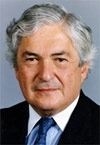CAMBRIDGE, Mass.--James D. Wolfensohn, president of the World Bank Group, cultural leader and former Olympic athlete, will deliver the principal address at MIT's 136th Commencement on Friday, June 7, in Killian Court.
"Jim Wolfensohn is deeply and thoughtfully engaged in important core issues of our times-- fighting poverty, promoting inclusion, enhancing education, and shaping globalization," said President Charles M. Vest. "He occupies a unique position at the intersection of the private and public sectors. His concerns have particular relevance to the world of 2002."
As president of the World Bank since 1995, Wolfensohn has visited more than 100 countries around the world. The Bank, established in 1944, is the world's largest supporter of programs that fund education, health initiatives and HIV/AIDS-fighting programs. Wolfensohn is the third president to be appointed to a second term in the Bank's 57-year history.
Typical World Bank programs include:
- The India District Primary Education program supports 226 districts in 15 states where the female literacy rate is below the average national rate. Programs in Brazil, El Salvador, Trinidad and Tobago support community evaluation of schools and teachers.
- The Multi-Country HIV/AIDS Program (MAP), created in partnership with governments in African countries, makes significant grants to organizations and communities that develop innovative HIV/AIDS interventions. Thus far, 12 African countries have received support, and another 15 will in the foreseeable future. A fund to fight HIV/AIDS in the Caribbean was approved recently.
- In Mali, a Bank-financed project helped establish 300 community health centers. Millions of families have received iodized salt through Bank programs which will significantly reduce miscarriages, still births, physical deformity and mental retardation.
Aware of the fact that World Bank events have presented security challenges elsewhere, Vest said:
"MIT has hosted many prominent world leaders whose views, countries or organizations may elicit a wide range of opinions. They have been treated respectfully by our community and we have maintained appropriate security. That will be the case at Commencement this year.
"After all, the debate is about how wealthy countries can best reduce poverty and enhance inclusion, education and social justice. These are things we should think about."
In addition to serving as president of the Bank, Wolfensohn is chairman of the board of the Institute for Advanced Study at Princeton University. He has received honorary degrees from Brown University, George Washington University, Michigan State University and Ben-Gurion University of the Negev. He is a fellow of the American Academy of Arts and Sciences and of the American Philosophical Society.
Wolfensohn was president and chief executive officer of his own investment firm for 15 years before he joined the Bank. Prior to that, he held senior positions at Salomon Brothers in New York, Schroders Ltd. in London, J. Henry Schroders Banking Corp. in New York, and Darling & Co. of Australia.
Throughout his career, Wolfensohn has been involved in a wide range of cultural and volunteer activities, especially in the performing arts. He was awarded an Honorary Knighthood by Queen Elizabeth II in 1995 for his contribution to the arts.
He served as chairman of the board of Carnegie Hall from 1980 to 1991, during which time he led its successful effort to restore the landmark New York building. He also served as chairman of the Board of Trustees of the John F. Kennedy Center for the Performing Arts in the 1990s. He is now chairman emeritus of both institutions.
A native of Australia, Wolfensohn holds B.A. and LL.B. degrees from the University of Sydney. He earned a M.B.A. from the Harvard Graduate School of Business in 1959. Before attending Harvard, he was a lawyer in the Australian firm Allen Allen & Hemsley.
Wolfensohn served as an Officer in the Royal Australian Air Force and was a member of the 1956 Australian Olympic fencing team.
He will be the 34th person to deliver the Commencement speech since 1951. From 1964-81, MIT Presidents Julius A. Stratton, Howard W. Johnson, Jerome B. Wiesner and Paul E. Gray were the principal speakers.






